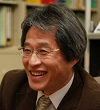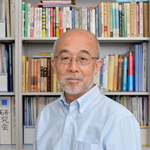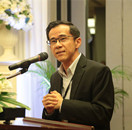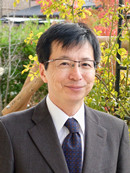Home > ICMENS 2021 Speakers
Keynote Speaker

Prof. Akira Toriumi, IEEE Fellow, The University of Tokyo, Japan
Biography: Akira Toriumi received the B.S. degree in physics, the M.S. and Ph.D. degrees in applied physics from The University of Tokyo in Japan in 1978, 1980 and 1983, respectively. Then, he joined R&D Center of Toshiba Corporation in Japan, in which he had been engaged in device physics and technology in CMOS miniaturization. He was with Massachusetts Institute of Technology, USA (1988–1990) as a visiting scientist on leave from Toshiba. In May 2000, he moved to Department of Materials Engineering of The University of Tokyo. He had also served as a high-k gate stack group leader in MIRAI Project (a national project for advanced CMOS in Japan) from 2001 to 2007. He retired in March 2019, and he is now an emeritus professor in The University of Tokyo.
Through his professional carrier, his research interests have been on device physics and materials science with regard to semiconductor devices. Particularly, he has investigated gate dielectrics, functional oxides, electron transport and processing science in Si and Ge CMOS, and low-dimensional materials and devices. He has authored and co-authored more than 600 scientific journal papers and conference proceedings, and several book chapters. He received several awards such as IEEE International Reliability Physics Symposium (IRPS), Best Paper Award (1997), Solid-State Device and Materials (SSDM), Best Paper Award (2000 & 2003), IEEE EDS Paul Rappaport Award (2004), SSDM Award (2014), IEEE Cledo Brunetti Award (2016) and JSAP (The Japan Society of Applied Physics) Outstanding Achievement Award (2017). He served as several international conference chairs and committees such as Executive Committee in VLSI Symposium (2008-2017), Program Chair (2005) and Organizing Chair (2018) in International SSDM, General Chair in Si-Nanoelectronics Workshop (IEEE/JSAP) (1999), Executive Committee (2004-2006) and Vice President (2012-2013) in JSAP, Vice Chair (2010-2011) and Chapter Chair (2012-2013) in IEEE EDS (Electron Device Society) Japan.
Speech Title: From
Higher Dielectric Constant to Ferroelectric Phase Formation
in Thin HfO2
Abstract: Before entering the 21st century,
various materials such as ZrO2, Al2O3,
TiO2 or Ta2O5 rather than
HfO2 had been investigated for high-k gate
dielectrics. Each material has own advantages and
disadvantages. After many efforts have been made, HfO2 has only been used
for advanced CMOS since 2007. A number of interesting
findings in HfO2 have been reported not only in
CMOS technology but also in materials science. This talk is
mainly focusing on higher-k HfO2, followed by
ferroelectric HfO2, from material science viewpoints.
Stacked high-k/SiO2 layers were formed in CMOS
gate stacks to suppress the carrier mobility degradation,
while anomalous threshold voltage shift had been pointed out
as the most serious problem in high-k CMOS circuits. We
investigated this phenomenon experimentally, and proposed an
intuitive model which reproduced experimental results. The
model is that charges at the high-k/SiO2 interface are
redistributed, and that a dipole layer which inevitably
shifts the threshold voltage is formed at the interface.
HfO2 has several polymorphs such as monoclinic, cubic,
tetragonal, and orthorhombic phases. It is theoretically
evident that each polymorph has a different dielectric
constant. HfO2 formed in the conventional device fabrication
process is of the monoclinic phase, which unfortunately
exhibits the lowest dielectric constant among several
polymorphs of HfO2. The challenge was how to form other
phases. We studied how to stabilize the cubic or tetragonal
phase of HfO2, and demonstrated the dielectric constant was
really enhanced by controlling the structural phase of HfO2.
Ferroelectric HfO2 was discovered recently. This is also
derived from a new structural phase formation of HfO2. The
charges inside HfO2 are redistributed associated with non-centrosymmetric
structural phase formation. Ferroelectric HfO2 is now a very
hot research topic in terms of promising device applications
as well as of material science and engineering.
Invited Speakers

Prof. Jun’ichiro MIZUKI, Kwansei Gakuin University, Japan
Biography: Jun’ichiro
MIZUKI graduated from Kwansei Gakuin University in 1973, and
obtained his M. Sc. (1975), and D. Sc. (1980) degrees from
Tohoku University in Japan. From 1980 to 1985 he worked at
KEK as a JASP fellow, McMaster University as a post doctoral
fellow in Canada, and Ames National Laboratory / Iowa State
University as a research associate in USA. From 1985 to 1996
he worked at Fundamental Research Laboratory in NEC corp. in
Tsukuba, and in 1996 he joined the Spring-8 group as a group
leader of Japan Atomic Research Institute (Japan Atomic
Energy Agency since 2005) and worked there till 2011. He
moved to Kwansei Gakuin University (KGU) in 2011 as a Full
Professor at School of Science and Technology in KGU, and
served as dean from 2017 to 2019. Currently he is a director
of Center for Research Initiative as Specially Appointed
Professor in KGU . He has been working on materials science
using Neutrons and Synchrotron X-rays, mostly focusing on a
study of dynamics of atoms and electrons affection reactions
and functions in materials. Current main activity is being
devoted on the strongly correlated electron materials, such
as high TC superconductors and the catalysts.
He served as the President of the Japanese Society for
Synchrotron Radiation Research from 2012 to 2013. He was
elected as the Chairman of X-ray Science of the Gordon
Research Conference in 2009.
Speech Title: In Situ Study of Oxygen Reduction Reaction (ORR) by Synchrotron X-rays
Abstract: Battery and catalyst technologies
are tied into future energy-, and environment-related
management strategies to realize sustainable society. The
understanding of electrochemical reactions is one of the key
issues to improve and develop the performance of battery
materials including catalysts. To fully understand the
mechanisms of electrochemical reactions and apply such
reactions to fuel cells, catalysts, and molecular devices
and so on, it is important to know the evolution of atomic
arrangements and their related electronic structures at
electrode–electrolyte interfaces under working conditions.
Synchrotron X-ray techniques stand out as one of the most
effective methods for satisfying such demands. I will
present in situ high energy resolution X-ray Absorption
Spectroscopy (XAS) applied to the investigation of surface
adsorption on Pt/C cathode catalyst of ORR. The purpose of
my talk is not to discuss the ORR mechanism in detail, but
to show the effectiveness of the spectroscopic technique
using Synchrotron hard X-rays for investigating
electrochemical reactions.

Prof. Pramoch Rangsunvigit, Chulalongkorn University, Thailand
Biography: Pramoch Rangsunvigit is a professor in chemical engineering at The Petroleum and Petrochemical College, Chulalongkorn University, Bangkok, Thailand. He received his B.Sc from Chulalongkorn University before his Ph.D. from Texas A&M University, USA. His research interests cover conventional separation processes like adsorption and crystallisation and hybrid separation processes. Photocatalysis is also another area that he has contributed to. In addition, he has extensively worked on gas storage technologies including hydrogen storage via adsorption and metal hydrides and natural gas storage through adsorption and gas hydrates. He was awarded with outstanding teaching and research from a number of organisations.
Speech Title: An Insight into Natural Gas Storage with Hydrate Technology
Abstract: Methane hydrates have been coined
as an alternative for natural gas storage. Despite of
advantages of the hydrate technology, attempts have been
made to overcome the technology limitation including slow
hydrate formation and formation conditions. Promoters either
using a small amount of chemical or the addition of a third
surface material were reported to be viable solutions.
Fundamentally, understanding the effects of promoters on the
methane hydrate formation are still of interest and will
further assist in the technology development. This work
explored how methane hydrate formation can be accelerated
through the aid of promoters. Investigated promoters
included tetrahydrofuran (THF), sodium dodecyl sulfate
(SDS), methyl ester sulfonate (MES), and hollow silica (HS).
Experiments in this work followed Inkong et al.. The results
show that the promoters accelerate the methane hydrate
formation with different phenomena during the formation. The
addition of THF with different formation temperature results
in different hydrate formation, which was also observed
through morphology investigation.

Dr. Motohiro SUZUKI, Japan Synchrotron Radiation Research Institute (JASRI), Japan
Biography: Motohiro Suzuki received his B. Sc. (1991) and M. Sci. (1993) degrees from Tokyo University of Science, and his D. Sc. (2004) degree from The University of Tokyo. He was a postdoctoral researcher (1997–1998) at Coherent X-ray Optics Laboratory, Harima Institute, RIKEN, and a researcher (1998–2006) at Research & Utilization Division, Japan Synchrotron Radiation Research Institute (JASRI). Since 2006 he has been a senior researcher at JASRI. He has worked on developing X-ray magnetic spectroscopy techniques based on synchrotron radiation, in particular, high-sensitivity X-ray magnetic circular dichroism spectroscopy with efficient control of the polarization of synchrotron X-ray. His recent research focuses on magnetic X-ray imaging of permanent magnets and spintronics materials using a nanofocusing X-ray beam.
Speech Title: Visualizing Three-Dimensional Magnetic Domain Structures by Synchrotron-Based Magnetic X-Ray Microtrography
Abstract: Magnetic domain structures are
closely related to the fundamental magnetic properties
including magnetostatic interaction, exchange energy, and
magnetic anisotropy. In practical magnetic materials such as
Nd-Fe-B sintered magnets, the nucleation of magnetic domains
and the pinning of domain-wall propagation dominate the
magnetization reversal processes and determine the strong
magnetic coercivity of this high-performance permanent
magnet. Since Bitter's first experimental confirmation, the
observation of magnetic domain structures has been an
important technique to understand the magnetic properties.
However, most of the conventional techniques are limited to
observation of two-dimensional magnetic domain structures
and observing the internal magnetic domains has been a major
challenge. In this study, we developed X-ray magnetic
microtomography technique using synchrotron radiation to
visualize the internal magnetic domains in a
three-dimensional (3D) manner. The 3D distribution of
magnetic domains in a GdFeCo microdisk was successfully
demonstrated. By applying this technique to a bulk Nd-Fe-B
sintered magnet under an external magnetic field, the
reversal of magnetic domains can be revealed in a
grain-by-grain manner. The creation of reversed magnetic
domains and domain evolutions can be directly studied.
